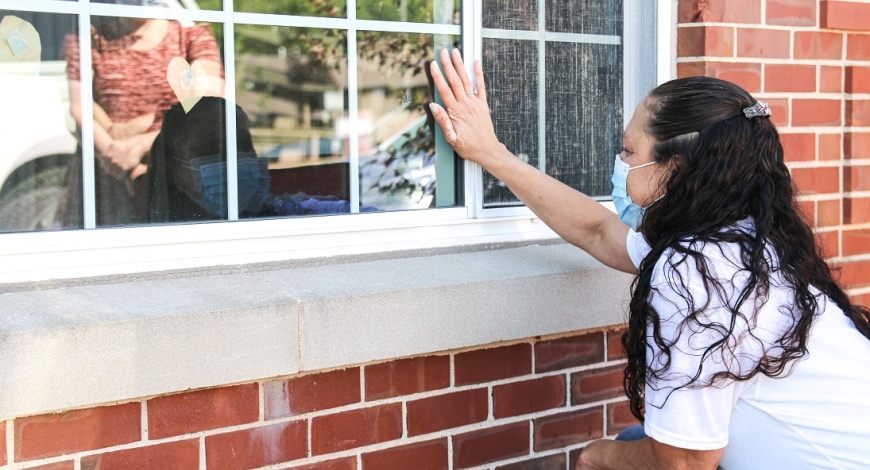COVID-Related Loneliness in Nursing Homes: Hope for the Future

Loneliness and the desire for human contact or interaction has been affecting many people throughout this pandemic. We have all missed hugs, handshakes, and even small smiles that are hidden behind our masks. But perhaps the population that has felt this the most has been the residents of long term care facilities. Whereas prior to COVID, residents were able to receive visits from families, engage in activities, and eat meals with other residents, they suddenly were confined to their rooms with minimal human interaction. This has undoubtedly affected many residents’ quality of life. In an article published by the Journal of Gerontology, researchers found that a large indicator for high quality of life in facilities is relationships, and having meaningful activities.
Nursing homes and family members have become quite creative in trying to help residents maintain these relationships and activities. Many facilities utilized a device whereas family could make video calls to their loved ones. Family members also did visits through windows, making signs to hold up with inspiring and loving message on them. Many nursing home staff members were the only interaction these residents had for many months, so they also took on the role as confidante, companion, and friend, spending more time with residents than they did before. As a hospice social worker, I have assisted in making video calls and phone calls with family members as well. When family members were not able to see their loved ones, they were grateful for just a simple phone call detailing how their loved one is feeling and coping as it was very difficult for them not to be able to see with their own eyes. Over the past few months many facilities have started allowing short visits in a designated room for family to see their loved ones, and this is no doubt greatly impacting residents in a positive way.
It is also recognized that the difficulties felt by the residents of nursing homes are also felt by the general population. This article by the American Psychological Association details some things we may all be feeling or have felt in the past year due to COVID precautions, such as depression, anxiety and loneliness. This article also discusses ways to combat these symptoms, such as:
- Maintaining a healthy lifestyle
- Eating healthy and exercising has been shown to improve mood and coping. Taking a daily walk, or just 30 minutes of cardio a day are some examples of things you can do to feel better.
- Staying virtually connected
- Regularly scheduled zoom meetings with family and friends can help reduce loneliness and keep you connected. Reaching out to a family member on the phone, or writing an email can also help others feel connected.
- Maintaining a daily routine
- Keep busy and active and reduce feelings of boredom. For example, every Thursday schedule a zoom meeting with a good friend, or plan to walk every morning at 10:00 for 30 minutes.
- Using psychological strategies to manage stress
- You may find it helpful to write in a journal everyday, to express how you are feeling during this difficult time. Meditation also has shown to reduce anxiety and stress. If you feel you need a stronger intervention, reach out to a therapist or counselor and schedule a zoom session.
It is important to note that these are not one-size fits all solutions, and hopefully everyone has found their own coping mechanisms to stay emotionally and physically healthy.
As a hospice social worker, it has been inspiring to see such dedication by family and various types of healthcare workers to ensure the best quality of life possible for our elderly and infirmed. As some restrictions are being lifted, things may still be difficult but hopefully we can all find hope for the future and also continue to support and love each other.
Contact Unity Hospice at 800-990-9249 to speak with a Social Worker or visit our website here to learn more about how we can support you.
This blog post was shared by Molly Carriveau, a Social Worker at Unity Hospice.
If you found this information helpful, please share it with your network and community.






